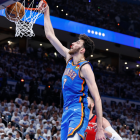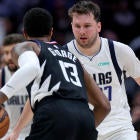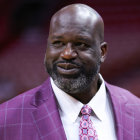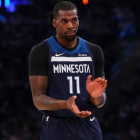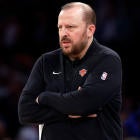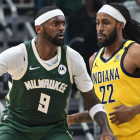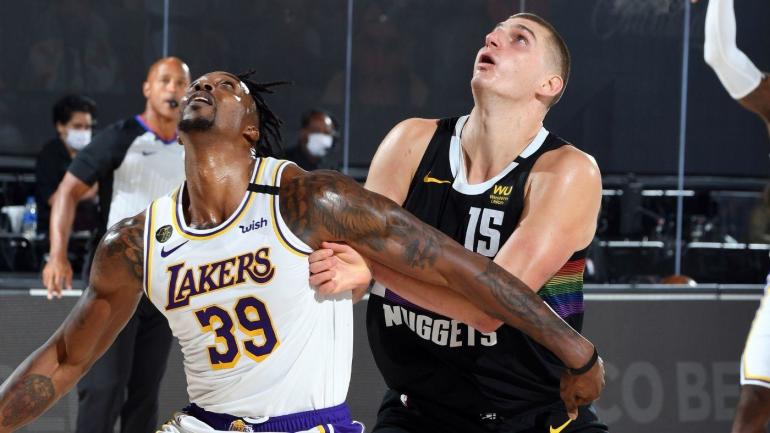
The first time the Lakers changed their starting lineup this postseason, it was an inevitability. The Houston Rockets were never going to allow the Lakers to play big for seven games. Markieff Morris' inclusion in the starting lineup was the natural adjustment to Houston's shooting and speed.
The second time the Lakers changed their starting lineup this postseason, it was something else entirely. JaVale McGee started every game he participated in this season. Dwight Howard started only twice, both in games not featuring McGee. While their minutes were relatively even, Frank Vogel showed little inclination towards a role reversal. McGee was the starter. Howard was the reserve. And then the Nuggets forced their hand, and the results were encouraging. The Lakers won Howard's minutes by eight points and took Game 4 to secure a 3-1 series advantage.
The move's success should prompt an encore. Howard will, in all likelihood, start Game 5 for the Lakers. But should he? There are pros and cons to the idea that goes beyond what transpired on Thursday, and where the Lakers ultimately go will say quite a bit about their priorities this postseason.
Pro: It's a major rebounding boost
The Lakers aren't nearly the rebounding team they could be. One of the few 2020 teams to consistently play two big men, the Lakers finished only ninth in rebounding rate. Some of that was intentional. The Lakers love letting Anthony Davis leak out after opposing shots to give LeBron James an outlet target in transition, and Davis' shooting draws him away from the basket offensively a fair bit. But one of the primary benefits of playing two big men is that usually, it leads to more rebounding, and that's a benefit the Lakers usually don't get.
Unless Howard is on the floor. When Dwight is in the game, the Lakers grab 52.6 percent of total rebounds, better than all 30 teams over the course of the season. Some of that is individual rebounding, as Howard had the NBA's ninth-best individual rebounding rate among players with at least 100 minutes under their belt at 19.1 percent, but his greater impact is as a team-rebounder. Howard led the Lakers with 3.3 box outs per game compared to McGee's two. In the playoffs, Howard has more than doubled McGee at 2.9 to 1.3.
That rebounding advantage manifests itself most often on offense, and that was the case in Game 4. Howard's six offensive rebounds helped the Lakers score 25 second-chance points. Denver only generated six, and after winning the Game 3 rebounding battle by 19, the Nuggets lost Game 4's by eight. Ending possessions is a defensive skill and extending them is an offensive skill. Howard does both better than McGee.
Con: It tires him out
This is subjective but relevant. Howard scored eight points and pulled down eight rebounds in the first half of Game 4. That span included 14 minutes of playing time. He entered Thursday having averaged 16 minutes per playoff game this season, and 18.9 minutes during the regular season. He was far less productive in the second half. In nine minutes, he scored four points and grabbed one rebound. That 23-minute total was the second-most he's played in the bubble, but half of the 24 minutes he played in Game 4 of the Portland series came in garbage time.
Again, there is not a definitive point of diminishing returns here, but it's a trend worth tracking because so much of Howard's game relies on his boundless energy in short spurts. He's 34-years-old, and as well-conditioned as he's been this season, he was never exactly known for his durability. The Lakers can squeeze more minutes out of Howard, but it's a balance. Would they rather have the best possible Dwight for 15 minutes? Or a compromised version for 25? It depends on the matchup and a number of other factors.
Pro: He's a better post defender than McGee
Howard wasn't competing with today's skinnier big men when he won his Defensive Player of the Year awards. He earned his hardware at a point in history dominated by post offense, and while that holds little weight in most matchups, it's essential to slow down Denver, which runs its offense through Nikola Jokic. The Clippers had to send 29 post-doubles at Jokic in their second-round matchup largely because they didn't have someone like Howard at their disposal. Those doubles led to the easy assists that knocked the Clippers out.
Howard has no need for post help. He finished in the 90th percentile in post defense this year, allowing only 0.667 points per post possession. McGee finished on the other end of the spectrum, allowing 1.2 points per post possession, and while the samples are tiny on both fronts, they make sense intuitively. Howard is stronger than McGee, and Jokic knows it. NBA.com's tracking data shows McGee having spent less than half as much time on Jokic than Howard (5:49 vs. 14:13), yet Jokic has taken 11 shots against McGee compared to only eight against Howard.
Dwight's strength is a deterrent. Jokic has attempted only one shot out of a post-up against him this entire series. For the most part, when Howard is in the game, Jokic is switch-hunting.
It shouldn't be viewed as a coincidence that Jokic's worst game of the series came in Howard's first start. Aside from Davis, he is the Laker best-equipped to defend Denver's superstar.
Con: It's begging for foul trouble
The Lakers fall right around league-average in terms of fouling, but Howard... doesn't. He commits 8.2 fouls per 100 possessions, far ahead of anyone else on his team and eighth in the NBA among players with at least 100 minutes of playing time this season. His 13 technical fouls don't help either, and while he trailed league-leader Russell Westbrook by three, Westbrook played over 700 more minutes this season.
Playing Howard more minutes is going to lead to more fouls, yes, but the timing of those fouls is particularly problematic. If Howard is starting games, he's also, presumably, starting the first and third quarters. Those early-quarter fouls help teams get into the bonus earlier, which changes the way everyone else can play defense. In that sense, Howard's minutes would likely be best spent coming in midway through quarters... yet for the most part, that isn't how Frank Vogel has used him. In the playoffs, the Laker rotation has called for Anthony Davis at center minutes to close most first and third quarters. Howard has usually come in to start the second and/or fourth.
In that sense, the fouling doesn't need to be as big a problem as it is, but Frank Vogel isn't going to overhaul his rotation over a couple of extra free-throws. The fouls are a problem, but one that can be overcome.
Pro: The Lakers play better with Howard on the floor
By rights, McGee should dominate the regular-season plus-minus minutes. He was a starter, and as a result, just under 70 percent of his minutes (781 out of 1,130) were played with both LeBron and Davis on the floor. The Howard-James-Davis trio played only 231 minutes during the season, but still, The Lakers were slightly better during Howard's minutes (plus-5.9 points per 100 possessions) than they were during McGee's (plus-5.8).
The overwhelming majority of McGee's positive minutes came with a starting lineup that no longer exists. The version of it that included McGee and Avery Bradley was plus-98. Over the rest of his minutes, he was only plus-33. Howard played with a far wider variety of lineups and thrived in all of them.
The bubble has emphasized that. McGee's lineups have largely struggled, but that was predictable based on Bradley's absence. Across nearly 300 regular-season minutes, the Kentavious Caldwell-Pope version of the starting lineup got outscored by 13 points. The Lakers didn't win McGee's minutes during a single seeding game, and while the first round was promising, his minutes against Denver have been similarly unsuccessful. Denver has won McGee's minutes by eight points... but lost Howard's by 30.
Now, there's an argument against fixing what isn't broken here. Howard was a stellar backup during the regular season. His physicality and energy overwhelmed backups. But the regular season is forgiving to suboptimal lineups. The playoffs aren't. It only takes one bad stretch to swing a game against elite competition. If the idea is merely to start the best possible Laker lineup with a big man alongside Davis, Every statistical indicator suggests that Howard is the proper center. Benches are more easily fixed than starting lineups.
The Verdict
The Denver series presents an easy choice. Howard has been better in this series, and he's a better matchup for the Nuggets on paper. That doesn't necessarily mean McGee should be benched entirely. Vogel made the unusual decision to play him with LeBron's second-quarter bench unit in Game 4 as an alternative to the smaller looks that struggled against the Nuggets. The Lakers won that five-minute stretch by three points.
The Finals, should the Lakers get there, present a different set of problems. The Celtics and Heat almost never post-up. Should Boston advance, Daniel Theis is going to spend his offensive possessions parked in the corner to try to draw his defender away from the basket. Broadly, this same logic with PJ Tucker led to the Lakers going small against Houston. Miami's rotation is more of a mystery. Bam Adebayo won't shoot 3-pointers, but Kelly Olynyk does. The Heat have tinkered with super small lineups of their own with Andre Iguodala and Solomon Hill at center. Howard and McGee aren't well-equipped to defend those, though the lob threat both would pose against such small lineups is tempting.
Right now, Howard is the right starter at center. It took the Lakers three games to arrive at that conclusion against Denver. Three games of experimentation against the Heat or Celtics could be three losses. Vogel might need to skip a step and jump directly to Davis at center for either matchup. At that point? Both Howard and McGee would have chances to earn bench minutes (especially against Boston's more traditional backup centers), but Davis at center is the likely endgame.















